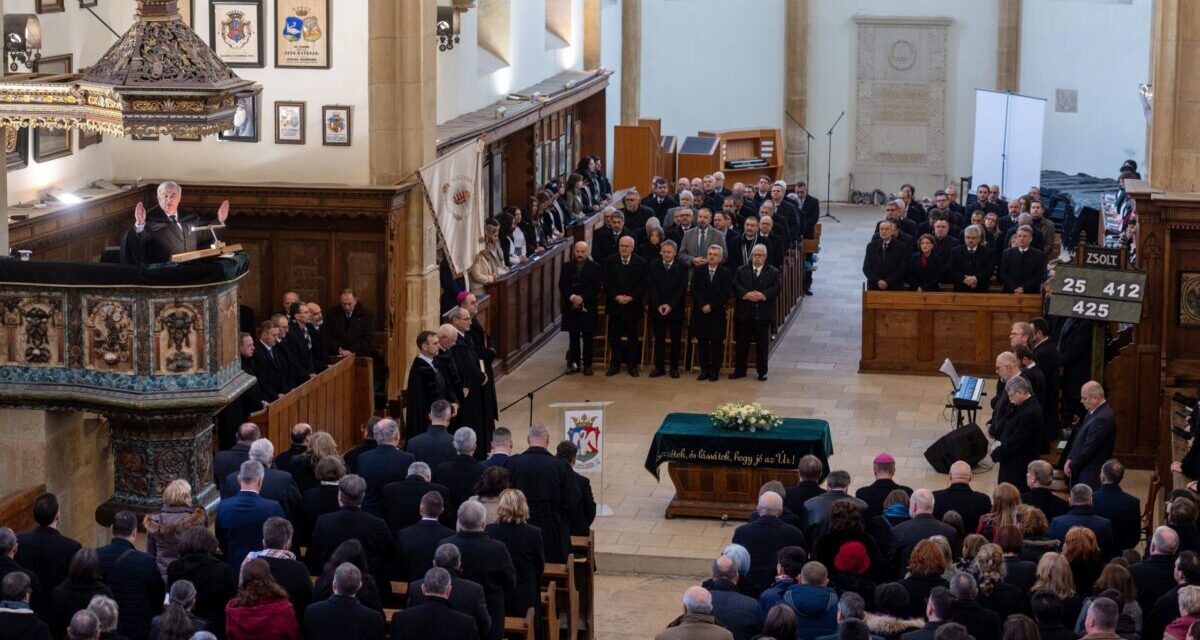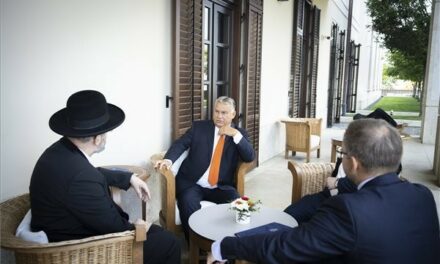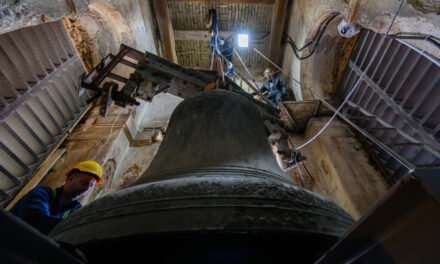"Our life is a blessed life in Transylvania, in the Carpathian Basin, and let's live it as long as possible," said the outgoing church leader.
With his community-building work, the outgoing Transylvanian Reformed bishop Béla Kató contributed to the effectiveness of Hungarian national politics, to the strengthening of sectarian and ethnic peace in Romania, and set an important and important European example for everyone to consider on the possibility of prosperity in the homeland and increasing the retaining power of the homeland - said László Kövér, the Speaker of the Parliament, on Saturday In Cluj, at the farewell service of the Transylvanian church superior.
Béla Kató, the 46th bishop of the Transylvanian Reformed Church District, who is retiring after two episcopal mandates totaling 12 years and 45 years of pastoral service, was bid farewell by his followers, leaders of Hungarian historical churches, sister churches, and public figures in the Farkas street church.
In his speech welcoming the outgoing bishop on behalf of the motherland, László Kövér, referring to Prince Gábor Bethlen's motto - that is, "it is not always possible to do what is necessary, but one must always do what is possible" - said: During his service, Béla Kató did not only what was possible, but also what was most needed.
"Transylvanian Hungarians who stick to their faith and their homeland always need a living example, a living example. The bishop set this example for his community. There is nothing more permanent than that which a person can give to another person," the President of the Parliament pointed out.
He reminded: for more than a hundred years, the Transylvanian Hungarians have been grinding in the existential paradox of "can't" and "can, because they have to", and Béla Kató helped to resolve this with "his Székely tenacity, wisdom and humble service", as he proved: "it is always possible! "
The bishop "proved that compliance is not only a constraint, but also an opportunity. He proved that standing still is not only suffering, but also happiness," declared László Kövér.
The President of the Parliament also warned of the existential paradox of European Christianity, of the disintegration that threatens human communities - family, nation, Christian churches - and pointed out: Béla Kató stood up to the diabolical destruction, tried to organize and strengthen value-conscious communities from individuals, while "all the while turning his service to the Lord continued, from which he drew faith and strength to act".
This example of Mr. Bishop permeates state and denominational borders and radiates the 21st century hope of survival for all European Christian communities, he concluded.
Béla Kató said in his sermon: he undertook a service that must be stopped when "the time is up" and the time of reckoning has come.
He recalled: when he was ordained as a bishop, he chose the first part of the story of the wonderful catch of fish - that of the despondent fishermen without a catch - for his sermon, and when he said goodbye, he read the continuation of it, when the nets are filled at the words of Jesus.
He said: during his bishopric, more than five hundred plans were realized, but more importantly, the communities were strengthened in their faith.
We can have no doubts about the future, we have received so much that there will always be something to look forward to, he said, referring to the churches, schools, kindergartens, and community centers built and renovated with the support of the motherland.
He told the new leaders of the church district: although it is not known what the future will bring, "Jesus is with us in the ark". "Our life is a blessed life in Transylvania, in the Carpathian Basin, and let's live it as long as possible," he said.
Prime Minister Viktor Orbán's message was read by Réka Brendus, head of the National Policy State Secretariat. In addition to the physical construction, the Prime Minister also thanked the spiritual construction, "with which it was possible to make it better and better to be Hungarian in Transylvania".
Kelemen Hunor, the president of the Romanian Hungarian Democratic Union (RMDSZ), drew attention to the "life work of the active and constructive man", whose episcopal mandate has ended, but who remains the president of the Sapientia Foundation. He highlighted Béla Kató's talent for recognizing extraordinary situations and being able to take advantage of moments of grace. He built the Transylvanian nation, and thus the nation as well, he declared.
The outgoing bishop was also greeted by the superiors of Hungarian historical churches and sister churches. József Vilmos Kolumbán, the newly elected bishop of the Transylvanian Reformed Church District, compared Kato to Domokos Szász, under whose bishopric Transylvanian Reformedism experienced a "golden age".
He called the past 12 years a historic time, and in addition to church and educational institute developments, he emphasized the establishment of the Reformed school network, in which eight thousand children study. "Béla Kató is the rebuilder of Zion in Transylvania," he said, who fought not only for the Reformed Church, but also for Hungarians in Transylvania.
As a delegate of the Hungarian Reformed Convention, Zoltán Balog, a Reformed bishop from the Danube region, said: their generation was entrusted with building and rebuilding, protecting the faith.
On behalf of the Transylvanian Protestant churches, the Unitarian bishop István Kovács quoted the passage "you are the light of the world" and said: Béla Kató's presence, which radiated to his surroundings, was never under a bushel.
On behalf of the Romanian Catholic Bishops' Conference, Archbishop Gergely Kovács of Gyulafehérvár thanked him for the "common journey", on which Béla Kató helped him with the experience of the older brother.
His grandchildren "blessed" the outgoing bishop with their common song, and then, on behalf of the church district, theology teacher Dezső Buzogány presented Let's build our Transylvanian Zion again! A commemorative album entitled "Memory pictures from the life of Béla Kató", which also contains interviews and studies.
In his acceptance speech, Béla Kató emphasized the importance of community cohesion and cooperation, and thanked the Hungarian government for its support, explaining that the results achieved were achieved when everyone did their part.
MTI
Cover photo: Béla Kató, bishop of the Transylvanian Reformed Church District, gives a blessing at the farewell service held on the occasion of his resignation in the Farkas Street Reformed Church in Cluj on December 14, 2024.
Source: MTI/Gábor Kiss













